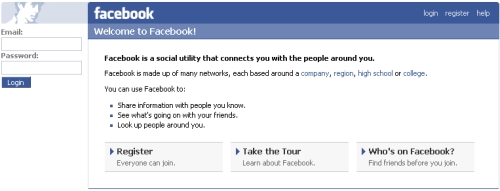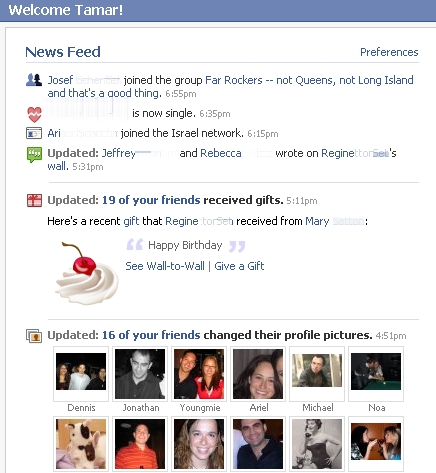I was one of the first users of Facebook back in April 2004 when it was rolled out to specific schools other than its founding community, Harvard. I had graduated college the previous year, so many of my classmates seemed to have “moved on” from the social sites of my time (all of which have dissolved). But over the past few months, the Facebook community has become a huge success and is continuing to flourish, and my classmates are slowly beginning to join the network.
I look back at Facebook’s emergence as a truly popular and desirable network that has simply gone from good to better. While other networks seem to lag behind, Facebook is truly another face in the crowd. And it’s obviously doing something right.

I “interviewed” my friend (and fellow ’03 grad) who recently signed up to Facebook. Why the sudden appeal? Not surprisingly, word of mouth took the cake. The icing? Her younger siblings were using it all the time. Facebook is not just a social network anymore; it is a society. I’ve seen several profiles with quotes to the likes of “I live on Facebook.” And several people are trying to convince others to jump on the bandwagon, because this one seems to be a keeper.
So what is Mark Zuckerberg, its founder, doing right? I would say he’s been able to strategize quite well from the beginning to the present. With that, I’ll take it back to its roots and when it was brought to my attention.
1. Facebook started out small, allowing developers to test and roll out features slowly. Facebook started off with Harvard, then with a few select schools, and then it gradually took on additional schools until it was open to all universities. Eventually, Facebook opened its doors to high school students as well. And then, in an incredibly bold move, it opened its door to everyone. This gave the the company the opportunity to test design, load times, and focus on optimization techniques as well as considering hardware upgrades as the user base increased.
2. Facebook is clean and usable. The Facebook interface no doubt is very attractive. Having a simple, yet totally functional design, is a reason why I have could say that Facebook is my winner among all social networks of its kind. Most people don’t like music that blares in their ears as soon as they click on a page, nor do they necessarily want to click on pages that may have images that are NSFW. Disallowing the ability to skin one’s personal page or add unnecessary sound bytes is totally fine with me. I’d add that the page loads are probably much faster for those reasons as well. I like to get where I want when I want to, and Facebook’s design makes that very possible.
3. Facebook lets you spy. Face it (no pun intended), Facebook is the ultimate stalker tool. (While the preceding video might be disturbing, single young men apparently have it very easy with Facebook.) In my case, I have particularly taken a liking to the News Feed. While this feature was met initially with a lot of dissent, I feel comfortable sharing this information with my friends — otherwise, I would not have established that connection with them. For those who are cautious about sharing too much, Facebook allow you to put specific rules in place, such as a Limited Profile, but I personally think it’s very interesting to see into the lives of my friends, whether it be a new hobby, a breakup (or an engagement announcement!), or the desire to establish a new group.

4. The Facebook staff is passionate about Facebook. If you haven’t read Inside Facebook by Karel M. Baloun, I would recommend it. One of the statements that most impressed me was about Zuckerberg’s desire not to sell Facebook despite its obvious attractiveness (to the point that he appeared to be avoiding acquisition talks). According to Baloun, Mark Zuckerberg is passionate about his product and wants to play a key role in cultivating that community without losing the control. That desire to invest in the community and to address the community is proving to be extremely effective.
5. Facebook isn’t selling you your contacts. As a student who looked to network with classmates, when I signed up to Facebook, I was not looking to pay any money to establish the connections. This is why Facebook, despite an already established threat, succeeded: it provided a free network to circumvent those obstacles. And it became viral as people continued to sign up for other obvious attractive reasons.
6. Facebook understands its demographics and practices smart marketing. If students aren’t looking to pay to connect to their friends (it would defeat the allure of coming to the site), the site needs to pay for itself in some other way. The Apple Students Group is a great way for Apple to market its own products, and over the summer, it offered free songs through iTunes. Further, students can purchase relatively affordable “Flyers” within their schools, which are non-invasive ads on the sidebar of the site. Surprisingly, this is being used not just for straight advertising. I’ve seen my share of “Happy Birthday Jane” flyers posted on my sidebar. Thoughtful.
7. Facebook is engaging. Last year, Facebook held an NCAA tournament on its site (which was another clever marketing tactic). The winner of the tournament scored an LCD HDTV. I barely know what the NCAA is, but I participated due to the “fun” factor. I randomly selected schools … and I won from my school:

8. Facebook started the naming game. Yes, I mean tagging. If I upload a group photo, I can tag the people in the photo to identify them. When I view my friend’s profile, I can view “more photos” (an unlimited amount can be uploaded to their servers, it seems), and I will be able to see photos tagged with this particular friend posted from anyone in his/her network, even if we’re not directly connected. It’s quite fun to stumble upon a photo of a friend I hadn’t seen in years — with a new son or daughter, or even with a crazy new hairdo.
9. Facebook has begun giving “bonuses” to paying customers. With marketing comes another way Facebook can benefit itself and society: virtual gifts. Last week, Facebook rolled out image gifts that users can give to a special someone. The first image is free, but each gift thereafter costs $1. From a marketing perspective, the timing they chose to reveal this functionality could not have been better: it was right before Valentine’s Day, and it was after Facebook had already established itself as an extremely popular website that people visit frequently. Moreover, allowing users to “try before they buy” was incredibly clever and keeps the hype strong. One usually isn’t enough, but it will get you started.
10. Facebook lets you network correctly. Just about every Facebook user I know of is a real person. On the other hand, other networks let you befriend national landmarks or fictional characters. I’ve personally seen Facebook terminate the accounts belonging to people who are using the service for non-genuine purposes. On Facebook, you can (and should) be yourself. (Please don’t mind the llama in my profile image.)
11. Facebook will help you find your job. For a short time, the CIA was using Facebook as a means to recruit prospective employees (but the group page seems to be dead now). Facebook also is purportedly forging a partnership with Jobster to give students an edge on the job market. (For Jobster, a career search network that I personally don’t have experience with, this is going to be a huge as more employers sign up with them to reach out to a greater candidate base than ever before.)
12. Facebook has its own API. At the end of August of last year, Facebook announced that had it own API. What does this mean? It allows for Facebook widgets, mashups, and more. As a small extension of that, Facebook allows you to create your own “profile badge,” a snippet of code that you can display on other websites, and even for users who don’t have Facebook. (Right now, the privacy measures for such things are tight, so you need to opt-in entirely for this. Smart.)
13. Facebook is still expanding. I started off using Facebook to network with my college classmates. That gradually spilled over to high school friends I lost touch with when high school search became available. Then, I noticed that my family members were joining too. Now, I’m networking with bloggers. I’ve been contacted from long-lost friends and it’s been a pleasant surprise. I remember trying to convince my peers in the past to sign up to social networks and it was never an easy task. However, in the past two weeks, I’ve asked several people why they didn’t have a Facebook account and they immediately signed up. (In the end, if everyone’s doing it — and I mean everyone — you probably should too.)
I must say that I haven’t been this excited about Facebook … well, ever. But there have been a lot of changes recently and it’s all been for the better. I don’t see any decline anytime soon. I think that Facebook’s future is very promising.
Update: Dennis says that gifts and tagging existed long before Facebook did. Perhaps that might be the case and Facebook isn’t as inventive as I thought it to be, but regardless of this knowledge, they are a success in their own right for making what already existed much better than their predecessors.
Update 2: While I did link to Sugarrae’s post in my original post (I’d been working on this blog post for quite awhile when that post was published), I would like to pay special mention to her 9 Reasons Why You Should Be Using and Watching Facebook because, among other things, it takes a particularly excellent look at the potential of Facebook from an Internet Marketing perspective. Her reasons are more compelling than mine, so check them out.




I gather always different opinions about web 2.0 and how to market with the different mindset of the \”new\” Internet. Will social interaction and networking really make the web different? Thanks for your thoughts on this!